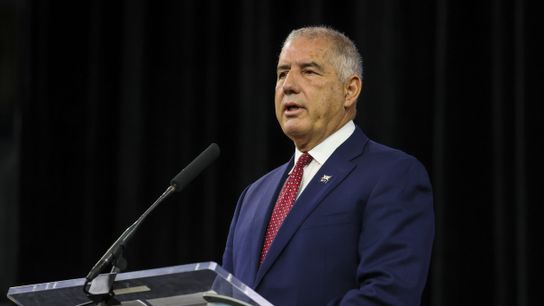The winning percentage for men and women of Congress running for reelection is well above .900, and yet the overall approval rating for Congress as an institution regularly huddles in the teens and twenties. In general, people like their guy or gal on Capitol Hill, they just hate everyone else's.
It's not that the public is wrong, necessarily, for loathing the way Congress goes about its collective business. But if each of us made the trip to Washington, sat down with our Congressperson in their office and took the time to learn about how and why the federal government is run, we'd be a lot more understanding of Congressional failure.
College sports is a lot like Congress these days.
In fact, if Gallup polled the public on "the NCAA," Congress might look as popular as strawberry milkshakes in comparison. No one seems happy with the way things stand in college sports at large here in the year of our Lord 2022, and yet 100 different people would likely have 100 different reasons why they hate the NCAA.
Last week, Big 12 commissioner Bob Bowlsby participated in the Aspen Institute's "Future of College Sports: Athletes as University Employees" forum (which is really just a fancy way of saying he did a public Zoom call with the former college sports journalist Jon Solomon.) The 70-year-old Bowlsby is a perfect avatar for the "college sports establishment" that exists today: he's run Big 12 for 10 years and spent 28 years as an AD before that. Bowlsby has served on just about every committee the NCAA has to offer, including the powerful Division I Council and the NCAA Presidential Task Force on Federal and State Legislative Issues.
And Bob Bowlsby is here to tell you the state of college athletics in 2022 stinks.
Bowlsby has heard your grievances, he agrees, and he'll add to your list with a list of his own. And yet, a lifer within the industry, Bowlsby also served as an effective tour guide, pointing out how and why all the ways in which people are dissatisfied with college athletics came to be.
The purpose of the discussion, as implied by the title, was to talk through what college sports would look like if student-athletes were codified into employees. Bowlsby's view was that it would be bad for all involved. Many sports -- primarily the men's Olympic sports -- would go away. Football and basketball players would have to collectively bargain for the creature comforts they take for granted now. Many of the same people arguing for athletes to become employees today would start howling tomorrow when a 20-year-old offensive lineman got fired or traded.
You can click here to view the entire half-hour conversation if interested, but I'd like to highlight the brief portion that swerved into our lane here at The Scoop.
“I would be the first to admit that the salaries of coaches, administrators and commissioners have gotten to absurd amounts," Bowlsby said. "If we had a good way to limit it, I think all of us would vote for it. But that isn’t the nature of the open marketplace.”
For the record, Bowlsby himself made $4 million in 2019-20.
Bowlsby is far from alone in disapproving of the marketplace for coaching talent in college sports in general, and college football in particular. In fact, even members of one of America's least popular institutions look down their nose at how much money colleges pay their coaches.
"I've had lots of conversations with elected officials and they all say, 'You've got to do something about coaching salaries,'" he said. "My response is, 'You tell me what we can do with it without getting sued and we'll be happy to implement it.' Then the conversation gets rather short."
If some sort of coaching salary cap were put in place, my hunch is the Powers That Be would be interested in the head coach clearing $9 million a year, but they might be even more interested in the running backs coach making $500,000 a year.
Bowlsby also said this: "There are programs in this country that have something approaching 200 staff members for their football program. It's absolutely mind-boggling and absurd. We can probably put some limits on some of those things, perhaps some sort of a luxury tax would be the way to do that. There are other approaches to it as well."
The NCAA may not be able to prevent head coaches from earning eight figures nor position coaches from earning half a million or more, but Bowlsby suggests there would be a way to govern how many total employees a college football program can have.
If I'm an active or aspiring FBS coach reading this, Bowlsby's quotes are simultaneously chilling and comforting. Chilling, because the commissioners, presidents and ADs resent how much they have to pay me and would limit it if they could. Comforting, because if such a limit were possible, it would've been put in place long ago.
Then again, college coaching salaries work a lot like the public's opinion of Congress. Your guy is worth every penny, it's everyone else who's overpaid.
